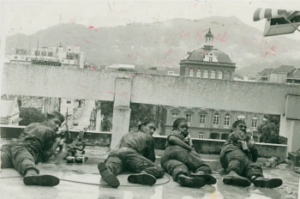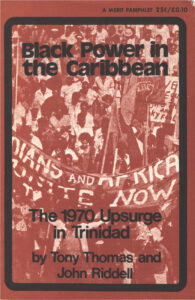|
Getting your Trinity Audio player ready...
|
Reading Time 5 mins
A Review of ‘ATTACK WITH FULL FORCE…’
— CLYDE WEATHERHEAD*
“A small band of heroic fighters, no matter how courageous, without the leadership of a strong political force armed with the necessary ideological outlook and linked to the masses of the people and mobilizing them ideologically and organisationally to take the insurrection to the conclusion of capturing the political power of the state by the people and in their interest will not achieve a decisive victory for the People’s Cause and the advance of the society. “
 History, it has been said, is written by the victors and therefore presents their perspective on the developments they are commenting about. Attack With Full Force by Ancil Antoine is one such account and was written specifically in response to a perceived failure to analyze the experience of the July 27, 1990 events from the perspective of the military victors.
History, it has been said, is written by the victors and therefore presents their perspective on the developments they are commenting about. Attack With Full Force by Ancil Antoine is one such account and was written specifically in response to a perceived failure to analyze the experience of the July 27, 1990 events from the perspective of the military victors.
In the preface is the complaint from the military viewpoint that “So far the books and journals which have been penned have focused on the reasons given by Abu Bakr for his actions on that fateful day… Their positive response to a crisis must never be unappreciated, forgotten, or confined to the dustbins of history.” The purpose of the publication was to fill this perceived vacuum.
Apart from his military qualifications, the author is a trained historian and participated in the events as a military leader. From those perspectives, he analyses some of the events leading up to July 27, 1990, including the deteriorating economic and social conditions of the deepening economic recession and the imposition of IMF-directed austerity measures by the NAR [National Alliance for Reconstruction] Government since its landslide election in 1986.
The growth of the mass use of illicit drugs and the emergence of gangs linked with the drug trade was also a feature of the 1980s. And there was widespread protest by the trade unions and other people’s organizations against the austerity measures, which included illegal cuts of 10% in the salaries of the public sector workers in 1989 and a sharp decline in employment in the construction industry, with unemployment rising to 22% in 1988.
The NAR government had fractured and split by March 1989 as the protests against its unpopular measures mounted. In this context, the Jamaat Al Muslimeen, which had been engaged in a long-standing battle with the central government and the Port of Spain Corporation over lands it occupied in Mucurapo St James, where it established its mosque and other facilities, including schools and dormitories, joined in the protest movement. It also conducted several campaigns to relieve the poor by supplying food, clothes, etc.
When the army and police were sent to occupy lands next to the compound of the Jamaat, ostensibly to prevent it from occupying any further state lands, the Jamaat protested the presence of this state force and what it saw as harassment of its women and members.
In 1985, one of its members, Abdul Kareem, was killed on a St James street while in the custody of police officers sparking mass protests calling for justice for his murder. Then in 1986, when the police launched a savage attack on anti-apartheid protestors outside the Queen’s Park Oval, the Jamaat played a leading role in reorganizing the demonstration after the police attack. The Jamaat became part of the Summit of the People’s Organisations (SOPO), which was leading the mass protest actions.
The author cites the report of the Commission of Enquiry into the 1990 coup: “No one in the Government seemed to appreciate that the economic situation had engendered such antipathy to the Government that it could create a platform of instability and an environment that would encourage Imam Abu Bakr to believe that he could launch an armed offensive against the Government which would receive popular support.” Thus, despite the close surveillance of the military-police unit outside the Jamaat compound, the Jamaat was able to launch its assault on the Parliament, TTT television station, and radio stations using what the author describes as the US Military Doctrine 8th Principle of War – “Surprise” when they attacked the State on 27 July 1990.
Despite what the author described as the major developments in the organization of the military, in responding to the several surprise attacks launched by the Jamaat and its heroic response and victory in being “… able to contain the insurrectionists within 24 hrs and force their unconditional surrender in 5 days,” The author asserts that “The response, however, demonstrated flaws in the application of the military operations and logistics doctrine and the implementation of its leadership and management philosophy.”
Antoine also identified failures or weaknesses in the military-police relations and coordination in the wake of the destruction of the police headquarters and the other surprise attacks by the Jamaat. Furthermore, the author recognized the non-performance of the premier civil intelligence agency of the time, the Special Branch of the Police, noting that although its reports were sent to the Prime Minister and National Security Minister, they “made no attempt whatever to communicate or share their intelligence analysis with the Defence Force or other National Security organisations, including the Commissioner of Police.”

TTDF Snipers on the roof of the Hall of Justice training their guns on the Red House during the attempted coup. (Source: The Trinidad and Tobago Guardian August 1990)
The declaration of a State of Emergency, the limitation of the field of operation of the insurrectionists to two locations in Port of Spain (the Parliament and TTT house), the loss of means of mass communication, and the failure of the anticipated general uprising among the population led to the failure of the military adventure that was the attempted coup by the Jamaat. The author also identified in the book’s conclusion some of these weaknesses of the adventurism of the Jamaat. He noted that they lacked the manpower and resources to adequately manage and control the situation they had created by their attacks on the Parliament and security forces and demonstrated a complete lack of understanding of their military adventurism’s operational and strategic elements. And failed to prepare and execute these plans for the second or third phases of their adventurism and grossly overestimated their actions as a catalyst to a popular uprising by the population, which had the option of removing the government at the next general election by the ballot box. [They] took this option in 1991.”
While the author set out to sing the praises of the victors, he described, “The military initial mission objectives were achieved within 24 hrs of the surprise attacks, and they were able to proceed with their other objectives of the release of all hostages and the unconditional surrender of the Jamaat al Muslimeen”, he was able in his analysis to examine some of the causes of the failure of the adventurism of the insurrectionist Jamaat.
 This was the second episode of armed insurrection against the state in 20 years in Trinidad and Tobago. In 1970, in the context of the mass actions of the working class and people, discontented with the failure of Independence promises to be delivered, there were two insurrectionist actions – one the mutiny within the Regiment by soldiers who refused to be used by the civil authority to put down the mass protest by force and the other, the guerilla campaign waged by a small guerilla force which was defeated by the state in 1974.
This was the second episode of armed insurrection against the state in 20 years in Trinidad and Tobago. In 1970, in the context of the mass actions of the working class and people, discontented with the failure of Independence promises to be delivered, there were two insurrectionist actions – one the mutiny within the Regiment by soldiers who refused to be used by the civil authority to put down the mass protest by force and the other, the guerilla campaign waged by a small guerilla force which was defeated by the state in 1974.
The 1990 failed coup attempt, like the earlier insurrections in two parts, demonstrated that the lessons of the 1970-74 experiences were not learned and used by the leadership of twenty years later. A small band of heroic fighters, no matter how courageous, without the leadership of a strong political force armed with the necessary ideological outlook and linked to the masses of the people and mobilizing them ideologically and organisationally to take the insurrection to the conclusion of capturing the political power of the state by the people and in their interest will not achieve a decisive victory for the People’s Cause and the advance of the society.
Clyd e Weatherhead is a Citizen and Advocate for Democratic Renewal of our Society and Governance.
e Weatherhead is a Citizen and Advocate for Democratic Renewal of our Society and Governance.

